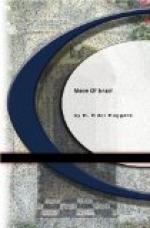Among the first came old Bakenkhonsu with a message from Pharaoh, and a private one to myself from the Princess Userti, whose pride would not suffer her to ask aught of Seti. We could tell him nothing except what I have written, which at first he did not believe. Having satisfied himself, however, that the thing was true, he said that he had fallen sick and could not travel back to Tanis. Therefore he asked leave of the Prince to rest a while in his house, he who had been the friend of his father, his grandfather, and his great-grandfather. Seti laughed, as indeed did the cunning old man himself, and there with us Bakenkhonsu remained till the end, to our great joy, for he was the most pleasant of all companions and the most learned. As for his message, one of his servants took back the answer to Pharaoh and to Userti, with the news of his master’s grievous sickness.
Some eight days or so later, as I stood one morning basking in the sun at that gate of the palace gardens which overlooks the temple of Ptah, idly watching the procession of priests passing through its courts and chanting as they went (for because of the many sicknesses at this time I left the palace but rarely), I saw a tall figure approaching me draped against the morning cold. The man drew near, and addressing me over the head of the guard, asked if he could see the lady Merapi. I answered No, as she was engaged in nursing her son.
“And in other things, I think,” he said with meaning, in a voice that seemed familiar to me. “Well, can I see the Prince Seti?”
I answered No, he was also engaged.
“In nursing his own soul, studying the eyes of the lady Merapi, the smile of his infant, the wisdom of the scribe Ana, and the attributes of the hundred and one gods that are known to him, including that of Israel, I suppose,” said the familiar voice, adding, “Then can I see this scribe Ana, who I understand, being lucky, holds himself learned.”
Now, angered at the scoffing of this stranger (though all the time I felt that he was none), I answered that the scribe Ana was striving to mend his luck by the pursuit of the goddess of learning in his study.
“Let him pursue,” mocked the stranger, “since she is the only woman that he is ever likely to catch. Yet it is true that once one caught him. If you are of his acquaintance ask him of his talk with her in the avenue of the Sphinxes outside the great temple at Thebes and of what it cost him in gold and tears.”
Hearing this I put my hand to my forehead and rubbed my eyes, thinking that I must have fallen into a dream there in the sunshine. When I lifted it again all was the same as before. There stood the sentry, indifferent to that which had no interest for him; the cock that had moulted its tail still scratched in the dirt; the crested hoopoe still sat spreading its wings on the head of one of the two great statues of Rameses which watched the gate; a water-seller in the distance still cried his wares, but the stranger was gone. Then I knew that I had been dreaming and turned to go also, to find myself face to face with him.




